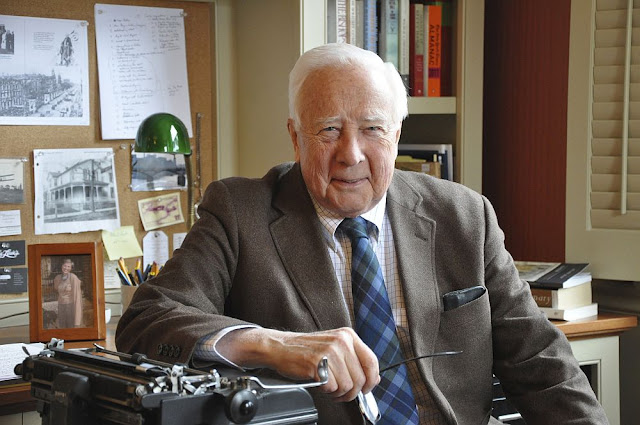This review, originally appearing in Critics at Large is reproduced here since it reveals how certain historical actors refused to cross that line of darkness in large part because they were well read and a keen historical awareness unlike the current President.
 |
| David McCullough, author of The American Spirit. (Photo by William B. McCullough) |
“We must all read history…” – John Adams, in a letter he wrote to his wife Abigail.
“Make the love of learning central to your life.” – David McCullough in The American Spirit.Most people may know David McCullough for his rich baritone voice as the narrator of Ken Burns’ landmark PBS series, The Civil War or as the host for twelve years of The American Experience. He is also well known for his Pulitzer prize-winning Presidential biographies of Harry Truman and John Adams – the latter adapted into an engrossing HBO series. He has written prize-winning studies on the young Teddy Roosevelt and the building of the Panama Canal. He was the subject of a wonderful portrait as a historian, raconteur and family man in the 2008 documentary Painting with Words, which is included on the John Adams DVD. In 2006, he was the recipient of the Presidential Medal of Freedom, the highest award a civilian can earn. Most recently, he has turned his attention to collecting his finest speeches over almost thirty years delivered at university commencements, historical societies, both Houses of Congress and the White House. The result is the lovelyThe American Spirit: Who We Are and What We Stand For (Simon & Schuster, 2017) which says as much about himself as the subjects of his mini-essays.
In his first (1989) and last address (2016), McCullough celebrates two members of Congress who he feels have not been given sufficient recognition – John Quincy Adams and Margaret Chase Smith. Quincy Adams – the son of the second President – who, after serving in several posts as Ambassador, became Secretary of State and then a one-term President (and overshadowed by his successor, Andrew Jackson). He was the only former President to be elected to the House of Representatives where he served with distinction for eighteen years, earning widespread support among his colleagues for his untiring energy, incorruptibility and his eloquence. A reader might wonder whether McCullough’s focus on Quincy Adams underscores his perception that there are few avatars of his principled spirit currently sitting in Congress primarily because they are more interested in serving their own Party than the people who elected them.
